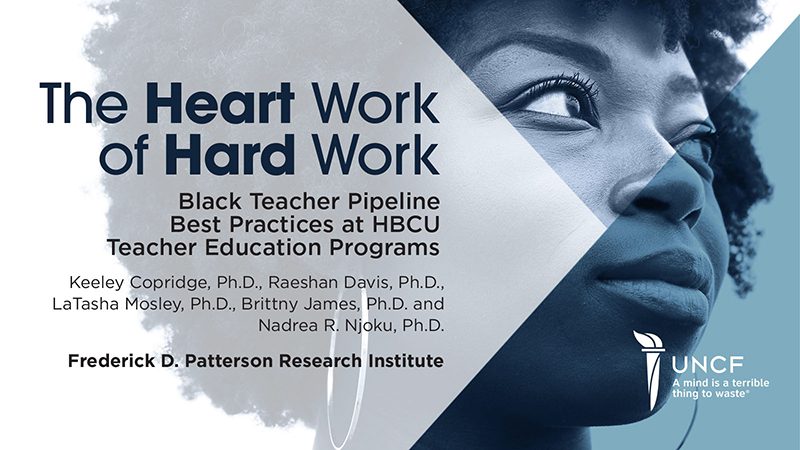UNCF Issues Revealing Report on Black Teacher Pipeline Best Practices at HBCU Teacher Education Programs

Media Contact
Roy Betts UNCF Communications 240.703.3384 roy.betts@uncf.org
HBCUs are major producers of Black teachers for America’s public education system
UNCF (United Negro College Fund) today released a special report identifying recruitment, curricular, and co-curricular best practices being implemented at historically Black colleges and universities (HBCUs) as major producers of Black teachers for America’s public education system.
The 40-page report titled “The Heart Work of Hard Work: Black Teacher Pipeline Best Practices at HBCU Teacher Education Programs,” provides a snapshot of the best practices four participating HBCUs shared to strengthen the Black teacher pipeline. The participating HBCUs were UNCF-member Huston-Tillotson University, Alabama A&M University, Albany State University, and Fayetteville State University. The selected institutions were listed among the top 25 four-year HBCUs that produce Black teacher college graduates in various K-12 education fields.
The report noted how Black teachers impact Black students’ educational development by serving as role models, improving their educational experience, improving graduation and college enrollment rates, increasing Black students reading and mathematics state scores, and increasing end-of-year grades.
The findings of the report will be discussed on Tuesday, Feb. 13, as part of the Equity in Education: Advancing Opportunities for Black Teachers and Parents virtual learning series. To learn more visit UNCF.org/EquityinEd.
HBCUs account for only three percent of colleges and universities. Yet, they produce 15% of Black graduates overall and 50% of all Black educators, according to UNCF’s Frederick D. Patterson Research Institute (FDPRI) and the National Association for Equal Opportunity in Higher Education.
“Black teachers are essential to Black students’ educational, social, and emotional development. Yet, Black teachers only make up seven percent of teachers in America,” said Keeley Copridge, Ph.D., senior research associate, Frederick D. Patterson Research Institute, UNCF, and one of the report’s authors. “To meet the diversification of America’s P-12 system, it is essential that we strengthen the Black teacher pipeline. Historically Black colleges and universities are critical conduits in the Black teacher pipeline,” said Dr. Copridge.
The report pointed out that the scarcity of Black teachers can be attributed to several factors, including desegregation, racism, and the incorporation of standardized tests that resulted in Black teachers losing their license.
Teacher certification exams eliminated almost 100,000 minority teachers in 35 states between the late 1970s and early 1990s. These certification exams are not ideal tools used to screen effectiveness, according to the report.
“Black teachers are knowledgeable of these barriers; however, they do not grant students pursuing teaching careers permission to fail; instead, we continue to maintain high expectations for the students to succeed,” said Nadrea Njoku, Ph.D., assistant vice president, Frederick D. Patterson Research Institute, UNCF. “The research is clear. Black teachers matter. Scholarship repeatedly illuminates how Black teachers have a deep understanding of Black students and their lives in and outside of the classroom.”
The findings of the report highlighted the need to leverage external partnerships to prepare students pursuing careers in teaching to transition to their role as educators. Huston-Tillotson University and Apple have created an African American male teacher initiative that enables students to become Apple-certified.
Fayetteville State, Alabama A&M, and Albany State University revealed how each institution provides financial assistance to help support their students. Faculty and administrators discussed investing their personal funds to supplement costs related to certification exams and individualized tutoring support that was not provided by the institution.
The conclusion of the report calls for:
- Continued research and analysis of culturally responsive curriculum in teacher education programs
- Examination of the validity of teacher certification exams and potential barriers promoting the exclusion of specific student populations
- Advocating at the federal and state level for funding for HBCU teacher education programs
- Engaging private organizations to partner with HBCU teacher education programs to assist in supporting future educators
- Increasing funding resources for HBCU faculty to implement innovative practices
- Continued establishment and promotion of non-traditional pathways to becoming an educator
In addition to Dr. Njoku and Dr. Copridge, other authors of the report are LaTasha Mosley, Ph.D., Raeshan Davis, Ph.D., and Brittny James, Ph.D.
The report was made possible by a donation from the Voya Financial Foundation.
###
About UNCF
UNCF (United Negro College Fund) is the nation’s largest and most effective minority education organization. To serve youth, the community, and the nation, UNCF supports students’ education and development through scholarships and other programs, supports and strengthens its 37 member colleges and universities, and advocates for the importance of minority education and college readiness. While totaling only 3% of all colleges and universities, UNCF institutions and other historically Black colleges and universities are highly effective, awarding 15% of bachelor’s degrees, 5% of master’s degrees, 10% of doctoral degrees, and 19% of all STEM degrees earned by Black students in higher education. UNCF administers more than 400 programs, including scholarships, internships and fellowships, mentoring, summer enrichment, and curriculum and faculty development programs. Today, UNCF supports more than 50,000 students at over 1,100 colleges and universities across the country. Its logo features the UNCF torch of leadership in education and its widely recognized trademark, ‟A mind is a terrible thing to waste.”® Learn more at UNCF.org, or for continuous updates and news, follow UNCF on Twitter at @UNCF.